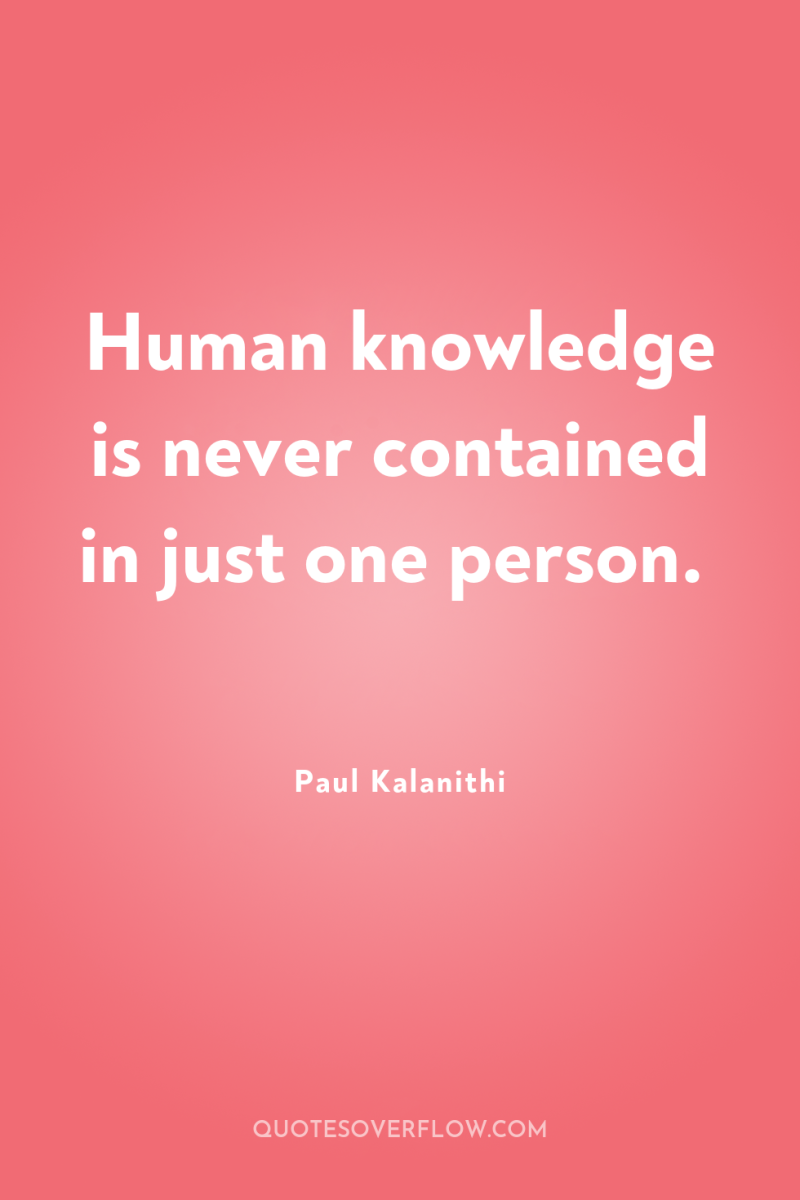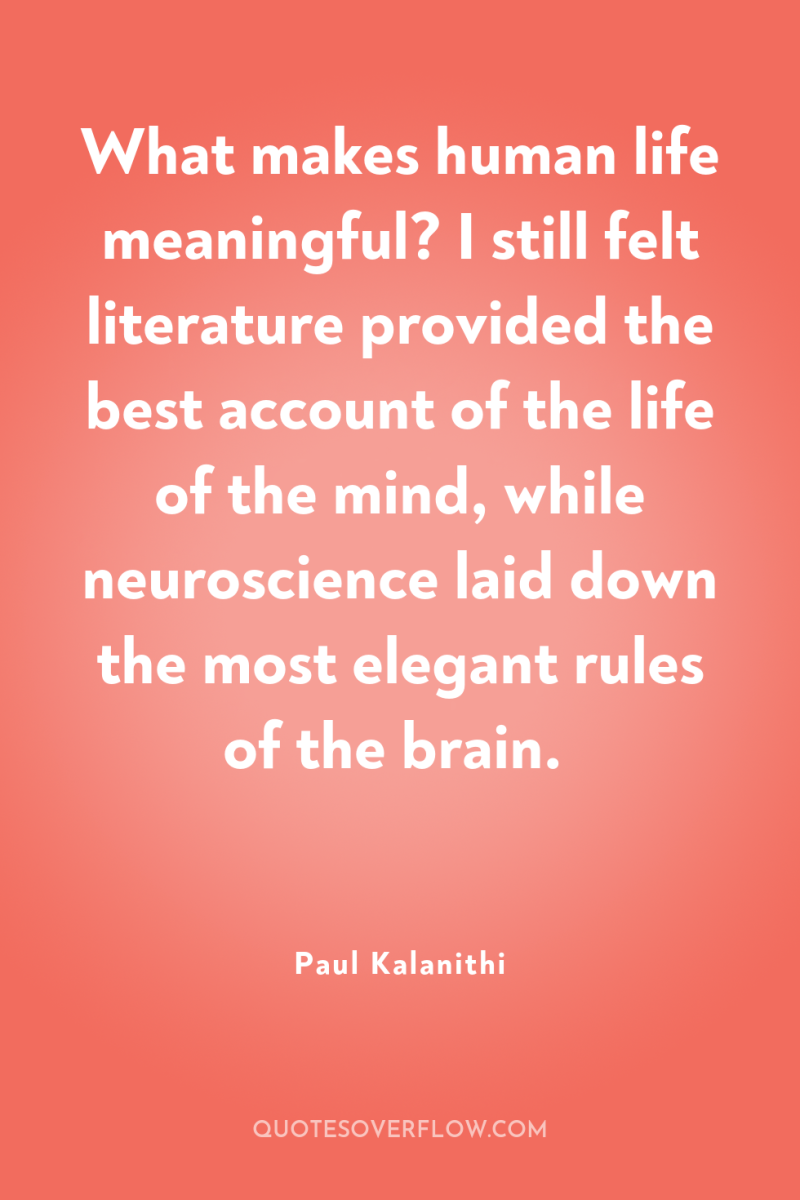
1
Human knowledge is never contained in just one person.Paul Kalanithi

2
What makes human life meaningful? I still felt literature provided the best account of the life of the mind, while neuroscience laid down the most elegant rules of the brain.Paul Kalanithi
3
Humans are organisms, subject to physical laws, including alas, the one that says entropy always increases. Diseases are molecules misbehaving; the basic requirement of life is metabolism, and death its cessation.Paul Kalanithi
4
Will having a newborn distract from the time we have together?" she asked. "Don't you think saying goodbye to your child will make your death more painful?"" Wouldn't it be great if it did?" I said. Lucy and I both felt that life wasn't about avoiding suffering.Paul Kalanithi
5
Even if you are perfect the World isn't.Paul Kalanithi
6
Literature not only illuminated another's experience, it provided, I believed, the richest material for moral reflectionPaul Kalanithi
7
I was searching for a vocabulary with which to make sense of death, to find a way to begin defining myself and inching forward again. The privilege of direct experience had led me away from literary and academic work, yet now I felt that to understand my own experiences, I would have to translate them back into language. Hemingway described his process in similar terms: acquiring rich experiences, then retreating to cogitate and write about them. I needed words to go forward. .Paul Kalanithi
8
Putting lifestyle first is how you find a job- not a calling.Paul Kalanithi
9
A word meant something only between people, and life’s meaning, its virtue, had something to do with the depth of the relationships we form.Paul Kalanithi
10
After I was caught returning at dawn from one such late-night escapade, my worried mother thoroughly interrogated me regarding every drug teenagers take, never suspecting that the most intoxicating thing I’d experienced, by far, was the volume of romantic poetry she’d handed me the previous week. Books became my closest confidants, finely ground lenses providing new views of the world.Paul Kalanithi
11
People often ask if it was calling. My answer always is yes.Paul Kalanithi
12
Putting lifestyle first is how you find a job-- not a calling.Paul Kalanithi
13
Often I return to the grave after leaving flowers — tulips, lilies, carnations — to find the heads eaten by deer. It’s just as good a use for the flowers as any, and one Paul would have liked. The earth is quickly turned over by worms, the processes of nature marching on, reminding me of what Paul saw and what I now carry deep in my bones, too: the inextricability of life and death, and the ability to cope, to find meaning despite this, because of this. What happened to Paul was tragic, but he was not a tragedy. .Paul Kalanithi
14
[H]e found poetry more comforting than Scripture–and his ability to forge from his life a cogent, powerful tale of living with death.Paul Kalanithi
15
Will having a newborn distract from the time we have together?' she asked. 'Don't you think saying goodbye to your child will make your death more pain¬ful?'' Wouldn't it be great if it did?' I said. Lucy and I both felt that life wasn't about avoiding suffering. Years ago, it had occurred to me that Darwin and Nietzsche agreed on one thing: the defining characteris¬tic of the organism is striving. Describing life otherwise was like painting a tiger without stripes. After so many years of living with death, I'd come to understand that the easiest death wasn't necessarily the best. We talked it over. Our families gave their blessing. We decided to have a child. We would carry on living, instead of dying. .Paul Kalanithi
16
The pain of failure had led me to understand that technical excellence was a moral requirement.Paul Kalanithi
17
As a resident, my highest ideal was not saving lives -- everyone dies eventually -- but guiding a patient or family to an understanding of death or illness.Paul Kalanithi
18
Mind was simply the operation of the brain, an idea that struck me with force; it startled my naive understanding of the worldPaul Kalanithi
19
Anatomy lab, in the end, becomes less a violation of the sacred and more something that interferes with happy hour, and that realization discomfits. In our rare reflective moments, we were all silently apologizing to our cadavers, not because we sensed the transgression but because we did not.Paul Kalanithi
20
Before operating on a patient's brain, I realized, I must first understand his mind: his identity, his values, what makes his life worth living, and what devastation makes it reasonable to let that life end. The cost of my dedication to succeed was high, and the ineluctable failures brought me nearly unbearable guilt. Those burdens are what make medicine holy and wholly impossible: in taking up another's cross, one must sometimes get crushed by the weight.Paul Kalanithi
21
The main message of Jesus, I believed, is that mercy trumps justice every time. Not only that, but maybe the basic message of original sin isn't "feel guilty all the time." Maybe it is more along these lines: "We all have a notion of what it means to be good, and we can't live up to it all the time.Paul Kalanithi
22
Everything teeters between pathos and bathos: here you are, violating society's most fundamental taboos and yet formaldehyde is a powerful appetite stimulant, so you also crave a burrito.Paul Kalanithi
23
What patients seek is not scientific knowledge that doctors hide but existential authenticity each person must find on her own. Getting too deeply into statistics is like trying to quench a thirst with salty water. The angst of facing mortality has no remedy in probability.Paul Kalanithi
24
Dying in one’s fourth decade is unusual now, but dying is not. “The thing about lung cancer is that it’s not exotic, ” Paul wrote in an email to his best friend, Robin. “The reader can get into these shoes, walk a bit, and say, ‘So that’s what it looks like from here. Sooner or later, I’ll be back here in my own shoes.’ That’s what I’m aiming for, I think. Not the sensationalism of dying and not the exhortations to gather rosebuds but: Here’s what lies up ahead on the road.” Of course, he did more than just describe the terrain. He traversed it bravely.Paul Kalanithi
25
Don't you think saying goodbye to your child will make your death more painful?"" Wouldn't it be great if it did?" I said. Lucy and I both felt that life wasn't about avoiding suffering.Paul Kalanithi
26
Time for me is now double-edged: every day brings me further from the low of my last relapse but closer to the next recurrence - and, eventually, death. Perhaps later than I think, but certainly sooner than I desire.Paul Kalanithi
27
There is a tension in the Bible between justice and mercy, between the Old Testament and the New Testament. And the New Testament says you can never be good enough: goodness is the thing, and you can never live up to it. The main message of Jesus, I believed, is that mercy trumps justice every time.Paul Kalanithi
28
Words began to feel as weightless as the breath that carried. Stepping back, I realized that I was merely confirming what I already knew: I wanted that direct experience. It was only in practicing medicine that I could pursue a serious biological philosophy. Moral speculation was puny compared to moral action.Paul Kalanithi
29
People react differently to hearing 'Procedure X has a 70 percent chance of survival' and 'Procedure Y has a 30 percent chance of death.' Phrased that way, people flock to Procedure X, even though the numbers are the same.Paul Kalanithi
30
Human knowledge is never contained in one person. It grows from the relationships we create between each other and the world, and still, it is never complete.Paul Kalanithi
31
What patients seek is not scientific knowledge that doctors hide, but existential authenticity each person must find on her own... the angst of facing mortality has no remedy in probability.Paul Kalanithi
32
Science is based on reproducibility and manufactured objectivity. As strong as that makes its ability to generate claims about matter and energy, it also makes scientific knowledge inapplicable to the existential, visceral nature of human life, which is unique and subjective and unpredictable.Paul Kalanithi